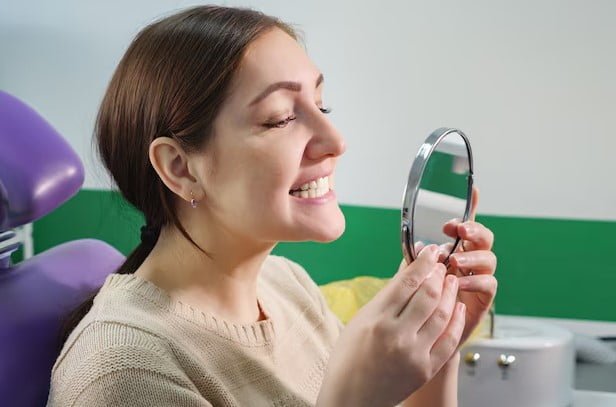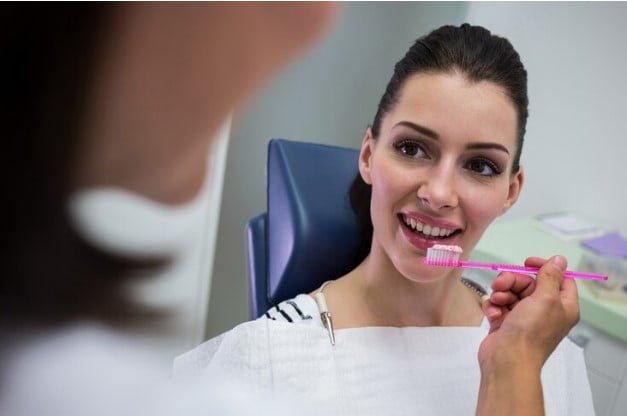
A beautiful white smile shows your beauty and health infront of your loved ones. With different products and services promising sparkling white teeth, it’s easy be confused about how it is working. A common query is whether a standard dental cleaning can benefit whiten teeth. This blog is designed to investigate the subject in depth, looking at the advantages of regular dental cleaning as well as how they compare with special teeth whitening treatments and answering a few commonly asked questions.
What exactly is Cleaning?
Cleaning the teeth, sometimes referred to as prophylaxis is a process carried out by dental hygienists in order to ensure the health of your mouth. It involves the removal of staining, plaque and tartar that have built up on the teeth.
Examination:
The dental hygienist will begin by looking at your mouth to find signs of gingivitis and other issues that could be causing concern.
Scaling:
Hygienists use specialized instruments to eliminate tartar and plaque from the teeth’s surface and also along your gumline.
Does Dental Cleaning Whiten Teeth?
Surface Stains
During the polishing stage of a dental cleansing, staining on the surface caused by foods such as drinks, tobacco, and food are eliminated.
Deep Stains
The stains can be caused by various factors, including age, certain medications, or exposure to excessive fluoride during the early years of childhood. The standard dental cleaning procedures don’t address the underlying stains and, therefore, if you’re trying to dramatically whiten your teeth, extra treatments may be needed.
The benefits of Dental Cleaning

Although a dental cleaning might not drastically lighten you teeth, the procedure provides many benefits that are important:
Helps to prevent Gum Disease:
Regularly scheduled cleanings benefit to eliminate tartar and plaque that can causes gum disease.
Teeth Whitening Options
If you’re trying to dramatically whiten your teeth There are many options to choose from:
Work-related In-Office Whitening
Vocational In-office whitening procedures are administered by a dentist. They use more powerful bleaching substances than other products. The treatments can lighten your teeth by a variety of shades in one appointment.
Pros:
Rapid outcome
A dental well-qualified
Cons:
More expensive
Could cause temporary tooth sensitiveness
Whitening Kits at-home
Kits for at-home whitening offered by dentists are made to suit your needs and are enriched with whiteners than the generic products. They typically require you to wear the tray that is that is filled with whitening gel over the specified time.
Pros:
Convenient
Effective
Cons:
It takes longer to observe payoff when compared to office treatments.
The tooth can be sensitive.
Over-The-Counter Product

There are many over-the counter products for whitening, such as gels, strips and toothpaste. While they aren’t as effective as skillful treatment options, they will nevertheless favor visible payoff with time.
Pros:
Affordable
Simple to make use of
Cons:
Less effective
It takes longer to be able to see payoff
The potential for uneven whitening
Frequently asked questions
How often should I visit the dentist for dental cleanings?
Typically, dentists recommend getting your teeth professionally cleaned every six months to maintain optimal oral health; however, those living with periodontal disease or needing more frequent cleanings may require more frequent visits to maintain optimal oral health.
Can I whiten my teeth right after having them professionally cleaned?
Absolutely; in fact, whitening treatments often prove more successful after having had their surfaces cleared of surface stains and plaque allowing the whitening agent to better penetrate tooth enamel.
How long will the teeth whitening last?
The duration of teeth whitening results will depend on an individual’s habits; to extend its effects further it’s wise to avoid stain-producing foods and beverages like coffee, tea and red wine as well as practice good oral hygiene in order to extend them further.
Are natural treatments effective for whitening teeth?
Baking soda and hydrogen peroxide may help remove surface stains on teeth; however, they should only be used sparingly as professional treatments are more likely to be successful at doing this job.
Conclusion
Dental cleanings are essential in maintaining good oral health. It brightens the smile, but professional teeth whitening services cannot compare when it comes to creating an significantly whiter smile. To enhance their smile fully, more information should be sought about professional whitening options.
Never forget, having a beautiful smile is more than cosmetic; it reflects overall health. Regular dental cleanings combined with good oral hygiene practices and professional whitening treatments can help you attain and maintain the smile you’ve always dreamed of having